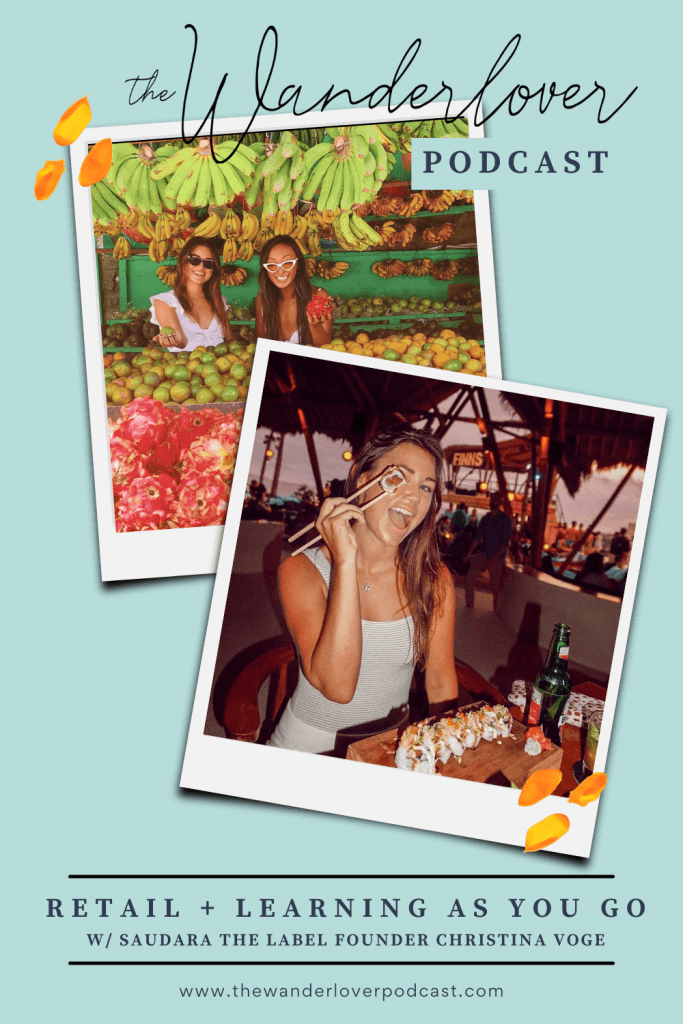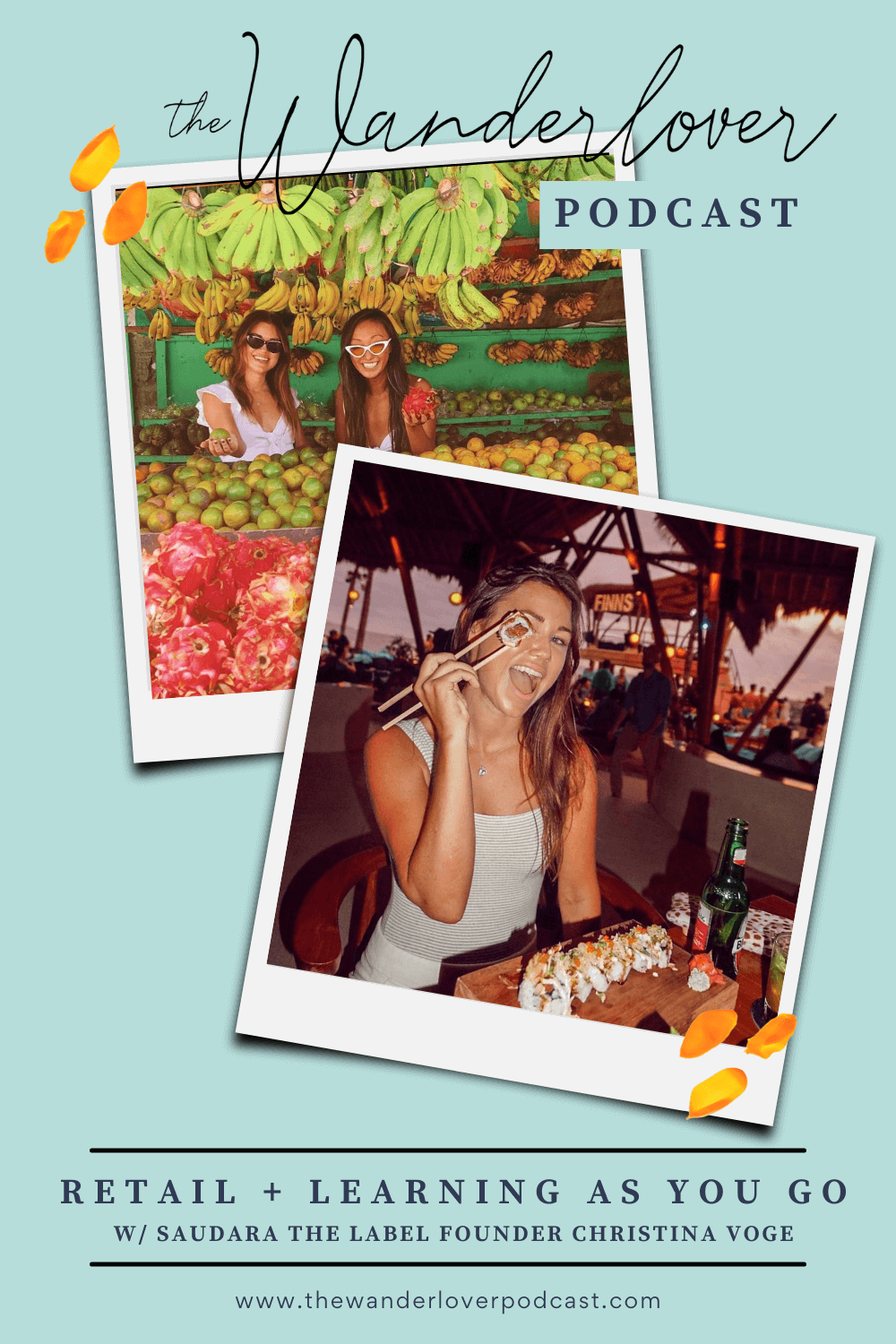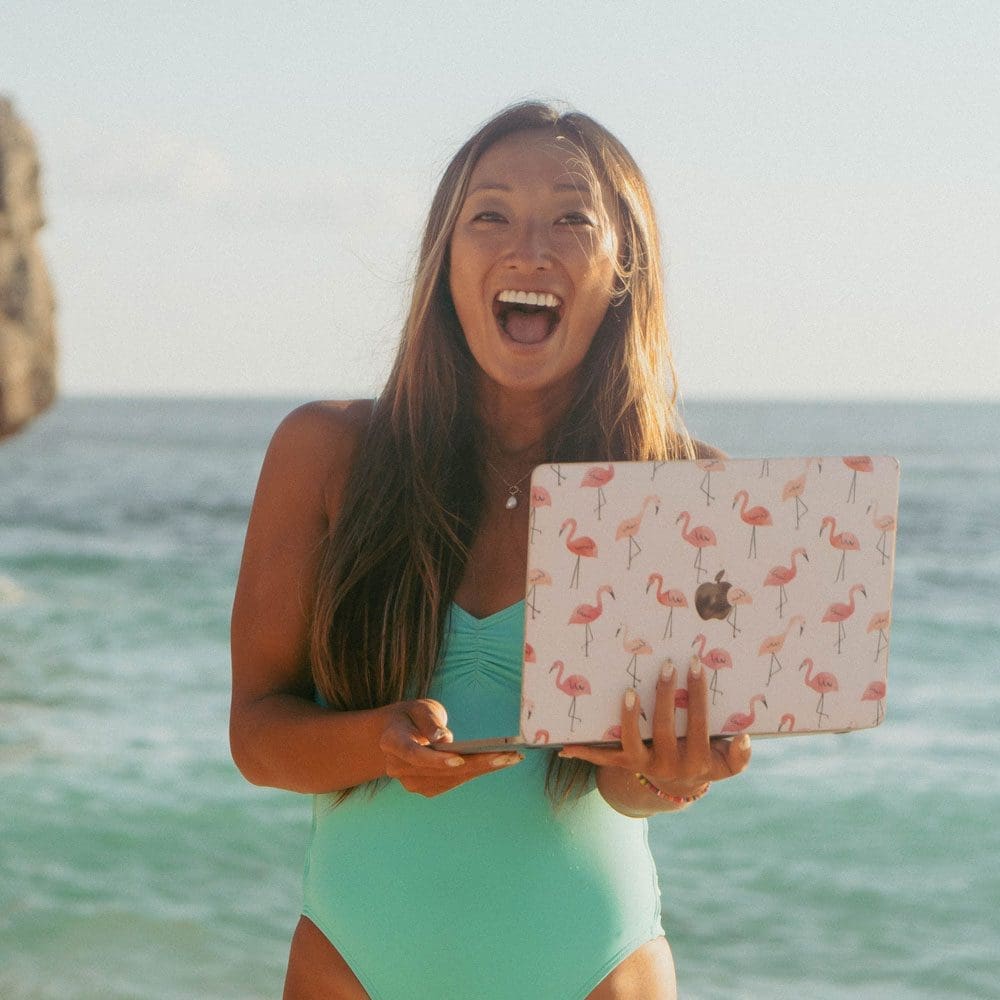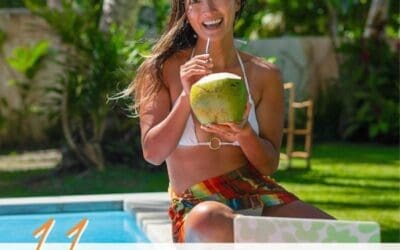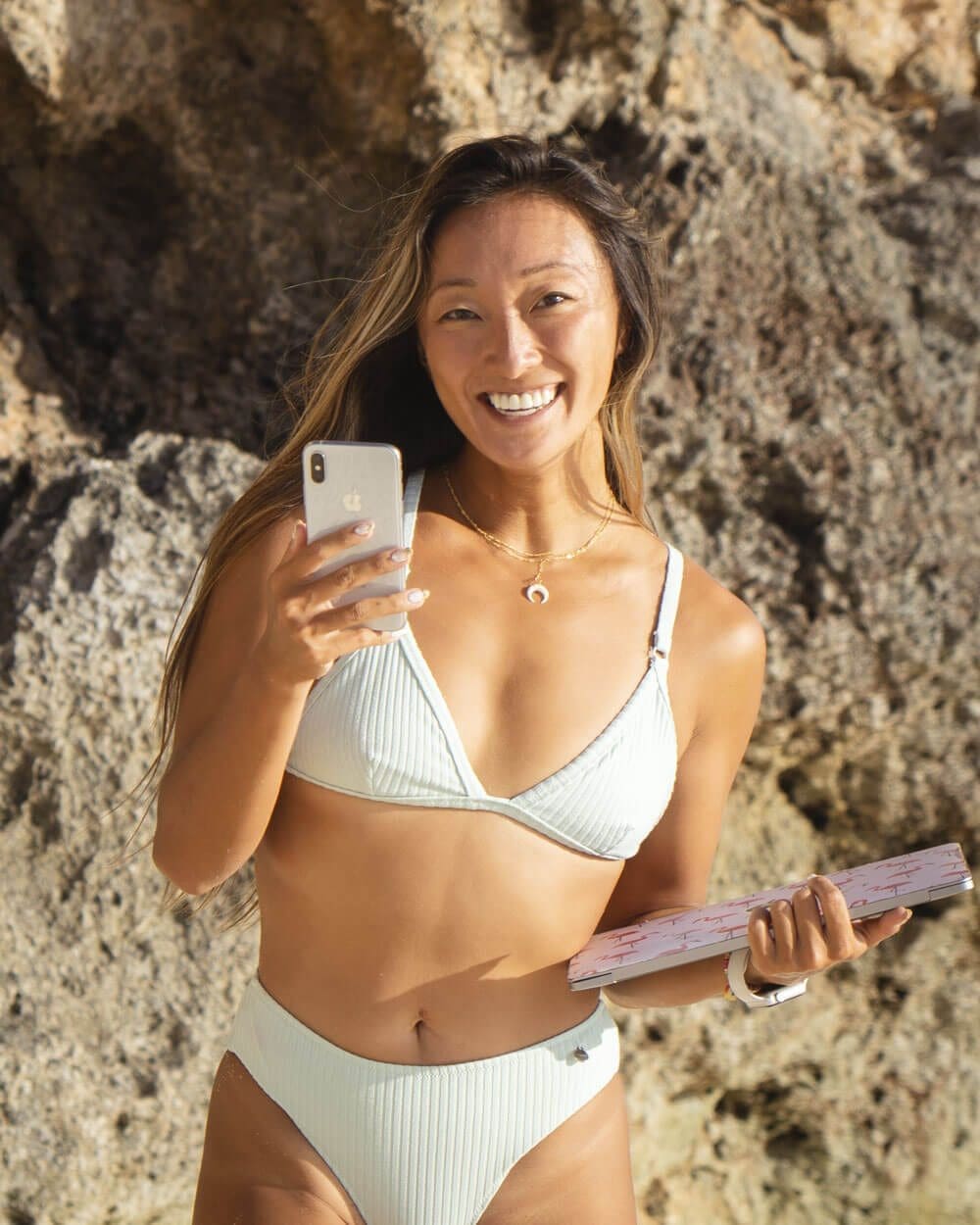This episode featuring special guest Christina Voge is all about the journey into retail (4:00), perfecting then progressing (11:45) and finding success through perseverance (24:15).
Quick Links
✧ Join The Wanderlover Coaching Group
✧ Download Your FREE 0 to $100K Game Plan
Audio Transcript
Intro (0s):
The Wanderlover podcast was created with a mission to enable travel and freedom through entrepreneurship. I’m your host, Danielle Hu business mentor, content creator, and founder of the wander lover tune in every week for episodes about travel online business, social media, and mindset that will inspire you to take massive action towards living the life of your dreams.
Danielle (33s):
Hi everyone. Welcome back to The Wanderlover podcast. This week, we have such a special guest, Christina Vogue, founder of Sadara the label. Welcome to the show, Christina.
Christina (46s):
Thank you! I’m excited to be here on my first podcast.
Danielle (51s):
We love firsts, and Christina and I met in Bali a few years ago. You reached out to me on Instagram because we had gone to like the same dinner restaurant.
Christina (1m 3s):
Yeah, that’s right.
Danielle (1m 5s):
And then it turned out we were neighbors and just hit it off. And we ended up traveling Argentina and Brazil together before COVID hit.
Christina (1m 17s):
That’s so crazy. I know. I miss you and I miss traveling and I miss Bali.
Danielle (1m 22s):
We’re waiting for you to come back ASAP, but Christina has been such an inspiration and I really wanted to bring her on this show because back when I met her in Bali, she was just starting out with e-commerce with working with Balinese suppliers for all different industries. Like you started off with swimwear, with leather goods and just like things that you would want to buy yourself. And it’s crazy because back then it was a completely new world. To me, had no idea how to even like sores, how to create things. And now with the launch of Ananda, it’s all coming together. So for those of you listening, Christina has a wealth of knowledge and we’re just gonna dive right in.
Danielle (2m 7s):
So where are you based right now?
Christina (2m 10s):
So I’m in Dana point, California. I’m actually doing hair because I was supposed to come back to Bali last, March 31st and keep working on the brand and then COVID hit. So I have not been back since, so it’s almost been like two years since I’ve been in Bali. And then I was just trying to go recently and I heard that everything’s closed. So
Danielle (2m 35s):
There are rumors though that they might be issuing visas again, it’s all a rumor, but I’m seeing it. Certainly
Christina (2m 43s):
I know I get updates from this visa guy on my WhatsApp, but he said, it’s all rumors and they have no idea when it can be open again. But hopefully soon, I mean, at least like, hopefully in the beginning of next year I’ll be able to go.
Danielle (2m 58s):
So all of your suppliers for Sadara are in Bali and you’re still working with them.
Christina (3m 4s):
Yeah. So I keep in contact with my main leather manager and he has like all of his crew of workers, still making stuff for me. So at least COVID has been actually like kind of a good thing for my business because I started focusing on that like a lot more now that I’ve been home. And so I’ve been doing like hair a little bit on the side, but mostly working on the brand, which has been awesome. So he’s actually hiring more people. So I’m, I’m excited about that because he still is able to like where I’m able to keep all of the Bali employees like employed.
Danielle (3m 43s):
Yeah. Yeah. Oh, that’s amazing. And I guess we’d love to hear how you got started and well, I guess what Sadara is and how you like came up with the idea for it.
Christina (3m 56s):
So I started traveling back in 2015 and a lot of people that knew I was going to go over to Australia. They’re like, you have to go to Bali and I ended up loving it. So in the beginning of my year long trip, I spent two months in Bali and then ended up the last two months of my trip, going back to Bali. And I met, met up with some girls and I met Simon. They took me to some other shops and I ended up like in there’s a certain part of Bali, where like, you can just go to like all these different leather stores. And if you don’t find anything that you want, they’ll basically be like, you can get this made or you show us a picture or like, if you want this and this color, like, and then I ended up meeting one of the guys that in the store and he took me to some of the like suppliers and I was all stoked.
Christina (4m 48s):
Cause I was like, yeah, I want to see where everything’s made. And he took me, I got on his bike. He took me into dump Huizar and I like picked out different color leather. So I was getting like, almost like way too many ideas. I started making like leather jackets and like just kind of going overboard with it, but it worked out. Cause I, I ended up first making, besides the jacket, I made like a wallet and all my friends liked it. And then I came home and my clients liked it. And so I was like, wait, this is fun. So I like just kept making more and more things for myself. And then I kind of talked my sister into coming the next time to Bali with me. And then we started the brand together.
Christina (5m 29s):
But now it’s just me. But when we started the brand Sudara is actually an Indonesian word for like sisters, brothers or siblings. So yeah, that’s where the name came from. But, and the brand kind of just started from me making things for myself first.
Danielle (5m 46s):
I love how you just went with it. Right? Like, did you know anything about manufacturing or producing leather goods before going to those shops?
Christina (5m 57s):
No, not all. I have my cosmetology hair and I don’t, I didn’t know anything about sales or business or like literally anything. So yeah. I just kind of like learned as I, as I went,
Danielle (6m 14s):
How in the beginning, like even before you started with Sadara, it’s like you brought it home to your friends and your clients and they all loved it. So you almost kind of did like the market research and test it out an idea.
Christina (6m 25s):
That’s true. I was getting so many things made. I’d be like, come home with boots and sandals jackets. Like I, one of the first things I made was this like duffle bag, like a travel bag. And I actually made a Python skin like wallet first. And then my client was like, like, yeah, I have this idea. Everyone seems to like it. And then she’s like, you can’t sell that in California. I’m like, oh, okay. Yeah. Like Python skin is illegal. Like I think only in certain states. So like California being one of them, you can’t sell it, but I know in other states you can, you might need some kind of lights in score it.
Christina (7m 6s):
But I was like, okay, I’m not going to do that then. And then I went back and I was like, I was just trying to think of like, something very different that not everyone does because at first I was like, oh, I want to do swimwear. But it’s like, everyone does that. So I was like, I, I stuck with the whole leather and then cowhide thing. Cause there’s not very many cowhide brands. So I don’t know. I kind of just wanted to stick to like one specific thing.
Danielle (7m 31s):
Yeah. And then when you started, so you like brought it back to your clients, how did you build out the brand at your first year?
Christina (7m 40s):
I mean, we launched the website, which we got like some help with that, but I mean, everything else I’ve kind of just been doing on my own, just building the Instagram, kind of just through word of mouth and then slowly putting it into like a lot of the local boutiques. So it’s still in, mostly in California and kind of just like right where I live, all the like beach community, like local to me is where like they carry my brand.
Danielle (8m 10s):
How did you like get in touch with the local boutiques? Like you just went into each boutique and asked if they would stock you
Christina (8m 19s):
Through friends or like I lived in San Clemente, so I would just honestly walk across the street into like the stores and meet like owners walked the go to Laguna beach. Yeah. I would just walk in or it was like the stories that I was either just regular at, or I could see my stuff in there. I would just like keep going in and then it kind of like snowball snowballed from there.
Danielle (8m 43s):
And how did you deal with international shipping and getting your products from Indonesia to America?
Christina (8m 52s):
Well, luckily before I moved back here, I had already up like a international, like a DHL account in Indonesia. So my leather manufacturer, her manufacturer or like leather manager, he actually I’ll send him the shipping label. Like he first sends me the size, the weight and like the invoice and just all that kind of stuff with the shipment. And then I type up the order and I just send him the shipping label and like, I guess it’s the invoice and he just prints it out and he puts it on the box and then he ships it from Indonesia to me.
Danielle (9m 33s):
Really convenient.
Christina (9m 36s):
Yeah, exactly. I have it all. Luckily I lived there enough to like figure it all out so that now that I’ve, I actually like, it’s all going smoothly.
Danielle (9m 46s):
That’s so great. And I remember the last time we were in Bali together was like 2019. Right. So like two years ago. But I do remember you went through a lot of struggles and just like inconveniences with all of these productions and like work ethic and you weren’t just really patient throughout the whole process Never gave up on it. So one specific incident that I remember was you had wanted to get this set made. So like a top and skirt and they were matching and it, like, I think it took a while for the whole like batch to be produced and they’re already waiting.
Danielle (10m 35s):
And then it finally came and they were like different colors.
Christina (10m 39s):
That one was like a very white, white, and then one was like off white. I’m like, we can’t sell this as a set together.
Danielle (10m 47s):
And think you had like provided the fabric. Right?
Christina (10m 51s):
Yeah. And, and then I don’t know where the other one came from. They just like probably ran out and then thought they would go buy their own and it didn’t match, but like, things like that would happen all the time. Like I’m sure people know if they worked with all the suppliers and manufacturers there, it’s like one sample might be perfect. And then you’re like, oh, okay, got it. And then the next sample, like the exact same thing, you’re like, all right, I want a bunch of these. And then they make it and it’s like completely wrong. And you’re like, but it was perfect the first time, like I just happened over and over and over again. And it was very frustrating.
Danielle (11m 30s):
What kept you going? Like getting just,
Christina (11m 35s):
Well, I actually only make bags now because I was like trying to, you know, just kind of have like a niche thing and perfect one thing. And I was just like going overboard at first. Like I, I actually did swimmer, I did linen clothing. I did, I was doing the bags and I had like the leather bags. I had some summery bags. I had just like way too. I had the colorful leather jackets. I was doing way too many things at once. And so it was, I feel like starting out, that’s another main thing. It’s like, you need to stick with like one small thing and perfect it before you should like expand out into all these things. So at least just now I’m only working with one factory.
Christina (12m 18s):
I don’t have to like, it’s way easier. I don’t have to like deal with so many different things, things. And then also with bags, you’re not dealing with sizing anymore. So that helped a lot.
Danielle (12m 29s):
How has COVID affected how you do things and where is Sudara now in the states?
Christina (12m 38s):
It actually was in the beginning since I wasn’t like working on anything else besides Sudara COVID actually helped like me. Like I was actually, cause I don’t go on stories and I don’t go on Instagram as much as I should or like marketing it. But like, I that’s all I was putting my time into doing was Sudara so it actually, and everyone was staying at home, so they were online shopping. So the boutiques and everything were closed. So it was actually, it was slow on that end. But since I was on online a lot, then the website was doing well. But now that I just don’t have like, it’s just me doing pretty much everything.
Christina (13m 19s):
So we actually did a trade show for the first time in so long, because during COVID last year in August, I was going to do my first trade show in New York and then that got canceled. And I finally did one in Las Vegas just last month in August. So it was not that busy, I think because of COVID and we’re kind of worried about that, but it ended up working out cause you network a lot and meet lots of people. And I met someone that owned a showroom. And so I just signed with the showroom last week and I’m shipping all of my products, there, all my samples there tomorrow, actually.
Danielle (13m 59s):
And so for the listeners who aren’t familiar, because I had no idea what a trade show and what is a showroom, right.
Christina (14m 6s):
Retail. So a trade show is for brands to like set up their, like they set up their brand in a booth. You can do like from a 10 by 10 foot booth all the way up until these like really huge boots. And sometimes they go like all out and buyers from all types of stores, like small boutiques or big department stores come to look at your line and like place orders for like their future for future. So it’s like, you can ship it either. Some times people want it like shipped right away. Some will want their orders for the next season. And so yeah, they just basically go there to look at all of your samples for the next season to put in their stores, but a showroom that was that’s a trade show, but like showroom is actually, it’s a company that represents a bunch of brands.
Christina (14m 56s):
So since I don’t have like a bunch of time to do all of this myself and like be reaching out to new boutiques every day and also a lot of, a lot of brands or like sores and stuff, they want to see stuff in person that you go to like a trade show or showroom to look at the product in person, especially my bags are like, everyone is kind of different. So like if I’m just emailing someone, Hey, this is my line sheet. Like, would you like to order a lot of people don’t like open emails and they don’t want to see stuff in person. So like now that my, my whole brand, my whole line is going to be like every single color of every single bag will be set up in this showroom in LA.
Christina (15m 41s):
So the peak buyers can go and look at everything and then place an order. So they don’t buy the stuff right then and there, but they like can see everything place an order and then we’ll ship it to their store straight to them.
Danielle (15m 53s):
That’s incredible. You have so much reach and outsourcing that part. Right.
Christina (15m 59s):
Right. And like the showroom they’re so good at like, you know, marketing it and sending out emails constantly. They have all the contacts like that I don’t have. And so they obviously will get it into way more stores than I can. And they’ll also take your brand to a trade show, a trade show. So I actually met her at the trade show and she was representing a bunch of, she like represents accessory line. So it works out perfect for my brand. Cause she’s, she didn’t do any clothing. She just does like a bunch of jewelry and bags and hair accessories and stuff like that. So being in her showroom will be great. And then she she’s going to go to like the Dallas market and Vegas and LA.
Christina (16m 42s):
So she’ll, she’ll be able to like show my brand to so many more people than I could.
Danielle (16m 48s):
I love it so much. And just like how much has changed in such a short amount of time and how much your brand has grown? What I’ve always admired about you is I feel like you just take action even when you might not have it all figured out yet. And you never let that stop you from doing anything. You just like, do it anyway.
Christina (17m 11s):
I might not be doing this. Right. But
Danielle (17m 15s):
So like how is that just part of your personality or do you have any advice to some people who are like, you know, they really want to do what you want to do, but they feel like they don’t know who the perfect supplier is, what their perfect product is. How did you like packaging and branding and cause there’s like so many moving pieces. Right. And you’ve been doing this yourself for most of them.
Christina (17m 36s):
I know. I don’t even think I would’ve done it on my own. Honestly. Like luckily I had my sister there to help me. And then we had friends, we had like friends that modeled or were good at websites and like kind of just taught us. And then, yeah, I don’t know. I was like, I think being in Bali just helped a lot because I honestly don’t think I would’ve started that over here. Like, and I wasn’t even really planning it, like my sister. And I always said like, oh, that would be so fun to like have a brand, but I honestly didn’t plan it or think that would actually happen. We just said it. But being in Bali and having so many resources there, like you can literally get anything you want made over there. Plus like on top of just getting the product made and having so many factories over in Bali, there’s like, you know, you just drive down the street and you see like all the like design places.
Christina (18m 26s):
And like you just get your hang tags and your business cards. And like, everything is so accessible in Bali. It’s just like easy to start a brand. I feel like so many people just start doing it because it’s easy. It’s easier in Bali than just to do it, like where I live.
Danielle (18m 41s):
Yeah. For sure. It’s like more in front of your face because like in front of you and you don’t have to go through like a sketchy website.
Christina (18m 49s):
Exactly. And it’s like, since it’s, in-person, it’s way easier. Like you don’t just walk into a store here and someone says like, oh, we’ll make anything for you. Like just show us a photo.
Danielle (19m 2s):
And even if they did, it would probably be like thousands of dollars.
Christina (19m 5s):
Oh my God. Yeah. Yeah. So I was just like, well, I’m just going to try it out, see how it goes.
Danielle (19m 15s):
So I also want to mention that Christina does food blogging as well. And she runs the Instagram two girls. One backpack also started off with your sister.
Christina (19m 29s):
Yeah. Now it’s just me. And that’s kind of how everything started was me leaving and traveling for a year and then posting traveling photos, which soon led to only food photos kind of when I was living in Bali because I was just eating out at restaurants every day. And that’s kind of how we met actually.
Danielle (19m 52s):
Yes. At koi.
Christina (19m 54s):
Wow. We were both really strong. Like we happened to be there the same way and, but we didn’t see each other, but I think IDM do about it.
Danielle (20m 4s):
Oh gosh, good times. Yeah. And even that, like with your Instagram, I love how like, you know, you started it without necessarily knowing exactly what niche you wanted to focus on for the rest of your life. Right. But then over time, as you did more peds, how you ended up just niching down. And I feel like a lot of people struggle with that because the term like niche and you really have to know your target market and target audience, they get really overwhelmed because they’re like, I don’t know what I should niche down on. I don’t know what I should focus on for like the rest of my life. And they put so much pressure on it because they see it as their business.
Danielle (20m 44s):
But it really takes like doing what it takes, like posting, creating the content, creating the products, like marketing it and selling it and then deciding from there what your audience wants and what’s most sustainable for you.
Christina (21m 1s):
I mean, that was kind of like the fun part for me, like being in Bali and my friends would help me. Like we would just like style the S the bags and outfits and take photos and editing that like that to me is like, not really work. Like, it’s a joke. It’s like fun. It’s not a job.
Danielle (21m 20s):
And now it’s your job. It’s like, that’s how business should be. Right. It should be like the path of least resistance where you’re able to have fun and make it a business and make sales and make money while enjoying like the process. Because other people, you know, photography and styling and editing that might be work to them. They might hate that. They might think like, just something so manual and they’d rather sit in front of a computer or something. Yeah.
Christina (21m 53s):
Yeah. And I don’t think that like the sales part, so I’m like, cool. They can go do that for me. Me and my sister both were like, yeah, I don’t really want to do that. So now I have someone to do it for me.
Danielle (22m 6s):
I love it. And it’s working out so well because you got to stay in your zone of genius and like what you’re good at, and you don’t have to spend time doing things you’re not good at and don’t want to do.
Christina (22m 18s):
Yeah, exactly.
Danielle (22m 19s):
What do you think has been the biggest catalyst or like turning point for your brand where it was just starting out as a passion project between you and your sister to now like being your full-time job?
Christina (22m 37s):
Well, I mean, it’s still, it’s not like it should be like my full time and I need to like break away from doing hair because I actually came home from Bali thinking I was just going to do Sudara, but that didn’t happen only because of COVID. So like all the boutiques and that the boutiques close trade shows got canceled. So I was like, all right, I guess I’m doing hair, which is like a good thing to fall back on. And then now that I’m like been doing it for at least a year now, now I’m like super busy and I’m like, shoot, now I’m only trying to do Sudara, but like, what do I do? I should probably just like stop taking new clients and I’ve narrowed it down to only working like a couple of days. But I think just working on it more, cause I like slowly, I’m doing less stays in the salon more days doing Sitara.
Christina (23m 23s):
And so, yeah, I think it’s weird, weird to say, but like, COVID actually like helped me with all of that. Just
Danielle (23m 32s):
Like having the times of focus on it
Christina (23m 34s):
And working on this, having the time to focus on it. And like in Bali, there was a lot of things that, yeah, I got to start the brand there, but I couldn’t do a lot of things since I’m actually selling it here. Like I came home, I, I actually finally started doing recently, like events, like in-person pop-ups and actually getting to walk back into like the stores and working on the Instagram, like doing everything myself back at home where we actually sell the product has like, I think that fully changed everything because I wasn’t able to do, go to trade shows when I’m back in Bali. So finally getting just the networking and everything here has changed pretty much everything.
Danielle (24m 17s):
Yeah. And when you were starting out, so like now you know that when you focus on it, it will grow. Did you ever doubt your capabilities in the beginning and Dow at any point like, oh, this, this isn’t gonna work. Like I’m going to,
Christina (24m 34s):
Like only in Bali, I was just like, it was just frustrating. So many times when things would mess up that you second, guess it like, oh my gosh, am I, should I even be doing this? This is like so annoying. So obviously it’s not always like smooth sailing. It’s like insane sometimes. But I probably thought about not doing it like multiple times, but I’m very glad that I stuck with it.
Danielle (25m 3s):
And how did you choose? Like even after those times you were like, fuck, this, it’s all going to look like my suppliers slug.
Christina (25m 12s):
It definitely helps. Cause I was like, there’s no way I can keep working with all of these different people. And they’re all like, I was just getting so frustrated at a lot of them. And the first person I actually even used in Bali when I walked into that store, when I, I started using him as my manufacturer and that, oh my gosh, that didn’t work out. He stole my money. He wasn’t organized. He like, he, I should have just known from the beginning. He wasn’t like that great in business and stuff. So I was like, I actually use one of his friends. It was helping him make the bags. And I knew he was more legit. So yeah, it definitely wasn’t easy in the very beginning.
Christina (25m 52s):
I was like learning as I went,
Danielle (25m 55s):
But you pushed through and now, and I think that’s so important for a lot of people to hear because they go on Instagram, they go online and you hear about someone when they’re successful. Right. Because it means that they’ve created the brand for themselves. They have the sales coming in. They have like a sustainable business. But what doesn’t get shared is like the behind the scenes in the beginning that everyone goes through, it’s never like from zero to a hundred ended day, it’s all about learning and mistakes. And we all go through it. But success comes to those people who just don’t quit.
Christina (26m 35s):
Exactly. Cause it took me five. This will, I think this December is actually five years that we launched the website. So I it’s been a while. It’s, it’s not, it’s not easy. It’s finally getting to that point where I’m like, I kind of know what I’m doing and I’m heading in the right direction. But like, it was a lot of frustrating things happen along the way.
Danielle (26m 59s):
Yeah. And it’s crazy how you still think, like you’re just starting to know what you’re doing, right? Because like I know that other people will look at you and be like, wow, this girl has her shit together. Like this is awesome, but what people share and what people believe it all comes from within. So it’s like, if you believe that you can continue and like grow the brand, then you will. But if you constantly get intimidated by other people who also don’t think that they have it all, Do you have any last words or advice that you’d like to share with our audience?
Christina (27m 44s):
Basically just, if you’re looking to start your brand, you need to trust the person that’s making your things and you need to start off small and don’t go too crazy. Like I did just stick to one thing. And once you get that going really well, then, then maybe expand your brand.
Danielle (28m 6s):
Yeah. And like you don’t always have to figure it out in the beginning. So learn as you go and there will be people out there supporting you and helping you every step of the way. Thank you so, so much for coming on the show, Christina!
Christina (28m 24s):
Thank you so much for having me!
Danielle (28m 25s):
I’ll see you all in the next episode. Bye guys. Have an amazing week. Bye!
~~~
✧ Follow Christina on Instagram: https://instagram.com/2girls1backpack
✧ Check out Saudara the Label: https://instagram.com/saudara.thelabel
✧ Free Case Study: https://thewanderlover.com/create-build-scale
If you’ve enjoyed this episode, it would mean so much if you could leave a review on Apple Podcasts. This helps us spread The Wanderlover mission to those who need a dose of inspiration today, thank you!
